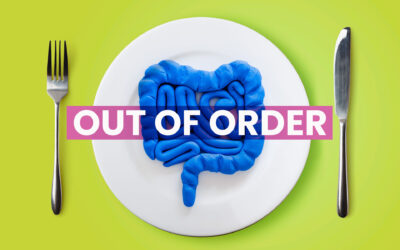Evidence is starting to emerge in scientific fields showing a link between gut health and the quality of sleep.
Current thinking suggests that adults should aim to get between 7-9 hours of sleep each night for optimal health and wellbeing. But let’s be honest, the majority of us do not come close to this amount. This can be for several reasons – but when asked, most people will say they lose sleep due to stress.
Stressing over money, relationships, work! To top it off, poor sleep tends to exacerbate this stress response. It is a vicious cycle.
There is a study that has been published this year demonstrating how prebiotics can reduce stress and promote sleep, through feeding beneficial bacteria that lives in the gut microbiome.
Let’s Recap the Essentials – to understand the sleep information
What is a prebiotic?
Before we dig into how prebiotics may help with sleep, let’s get a quick refresher on what we mean by prebiotic.
Prebiotics are essential food for the beneficial micro-organisms that live within the microbiome. These are the micro-organisms that determine the health of our gut and virtually our whole body.
Prebiotics are compounds within food and supplements that can’t be digested by the body. But they feed the beneficial organisms living in your gut. This gives them the fuel essential for the good bacteria to perform all their health-promoting activities in the body.
Prebiotics are present in foods that are high in fibre, such as grains, flaxseed, bananas, leeks and onions. They are also found in resistant starches. They are the compounds that aren’t broken down by digestion. Gut Performance® has been scientifically proven to be an excellent prebiotic source.
Quick Rundown on the Gut-Brain Axis
Research over the past decade has identified a close and constant interaction between the gut microbiome and the brain. We will quickly go over the basics on how the two connect to fully understand why prebiotics may be so significant when improving sleep.
So, what does the gut-brain axis look like? Well, it has three primary pathways between the gut and the brain. They send signals in both directions.
Immune system pathway
Both the brain and the gut microbiome stimulate activity of immune cells, which have a direct reflection on the body’s response to stressors through the modulation of inflammation.
Endocrine system pathway
Both the gut and brain regulate production and release of many hormones and neurotransmitters. These include cortisol (stress hormone), serotonin (mood), melatonin (sleep), and dopamine (mood) amongst others.
Nervous system pathway
This is where the vagus nerve acts as a direct line of communication between the brain and the gut microbiome. Additionally, the micro-organisms in the gut can travel the vagus nerve into the central nervous system, where they directly affect brain activity, including sleep patterns and stress responses.
If you want to find out more about the gut-brain axis, check out our blog post here for more information.
What the research has found up to now!
It is well understood and accepted that the diversity of organisms within the microbiome (both the types and amounts of different microbes) influences our mental, and physical health. It impacts the whole body, including mood, metabolism, cardiovascular, and immune health.
Researchers have only just begun to study gut health and its impact on sleep.
There is evidence building to show that as with all systems in the body, sleep and the gut microbiome exist in a two-way relationship. Scientists still don’t fully understand the relationship, but our microbiota seems to influence how we sleep through hormone and neurotransmitter regulation. In turn, circadian rhythms appear to affect the health and diversity of our gut (Smith, Easson, Lyle, Kapoor, & Donnelly, 2019) (Voigt, Forsyth, Green, Engen, & Keshavarzian, 2016).
It is well known that stress, illness and overuse of some medications can disrupt the health of the microbiome. But now, it has been established that poor sleep can quickly harm microbiome health (Beneidict, et al., 2016).
But what does this have to do with prebiotics and sleep?
In the latest research, scientists have investigated how prebiotics influence the composition of the gut and how prebiotics affect stress and sleep, through their influence over the microbiome (Thompson, Vargas, & Dorrestein, 2020). This study was done in the laboratory and yet to be further investigated in human subjects.
Essentially, they found that dietary prebiotics can improve non-rapid-eye-movement sleep (NREM). This is the sort of sleep that is deep and restorative.
They also discovered that after being induced with stress, subjects with a diet rich in prebiotic compounds appeared to blunt the stress response. This also increased more time spent in rapid eye movement sleep (REM). This type of sleep is critical for recovery from stress.
The researchers believe that it’s due to bacterial metabolites, such as short-chain fatty acids signalling the brain through the blood and/or vagal pathways. They have theorised it is feasible that diets high in prebiotics help produce these bacterial metabolites and therefore affect the brain and sleep-wake cycle.
Tips for a Good Night’s sleep
- Ensure you have optimal gut health. Take Gut Performance® as recommended to increase your prebiotic intake. Gut Performance® is not a supplement, but a Food with Purpose™. It is 100% natural plant-based food product so your body will get the maximum benefit from the unique blend of three gut superfoods.
- Try to get up at the same time every day. This stabilises your circadian rhythm
- Get sensible exposure to Vit D – morning sunlight. Five to 10 minutes daily can be a starting point. It often improves energy and alertness.
- Avoid alcohol. Although it may help you fall asleep, it does not contribute to a restful night of sleep.
- Practice mindfulness or meditation. It evokes a state of relaxation and has been shown to help fight insomnia.
- Take a warm bath before bed and make sure your bedroom is cold. A slight drop in temperature can improve sleep quality.
- Remove all electronic equipment from your bedroom. Yes, that means your phone as well!
So the evidence is mounting to clearly establish what people have experienced. Excellent gut health can not only promote good sleep but enhance your overall wellbeing. And prebiotics, such as that found in Gut Performance® may improve your REM, NREM and reduce the effect of stress. Remember, if you have symptoms worrying you, always consult your health care professional.
Give us a shout out via #lovegutperformance and tell us how Gut Performance® has enhanced your gut health and wellbeing. We love to hear how our product is changing lives for the better.
Works Cited
Beneidict, C., Vogel, H., Jonas, W., Woting, A., Blaut, M., Schurmann, A., & Cedernaes, J. (2016). Gut microbiota and glucometabolic alternations in response to recurrent partial sleep deprivation in normal-weight young indivdiuals. Molecular Metabolism, 5(12), 1175-1186. doi:10.1016/j/molmet.2016.10.003
Smith, R. P., Easson, C., Lyle, S. M., Kapoor, R., & Donnelly, C. P. (2019). Gut microbiome diversity is associated with sleep physiology in humans. PLOS ONE, 14(10). doi:10.1371/jounral.pone.0222394
Thompson, R. S., Vargas, F., & Dorrestein, P. C. (2020). Dietary prebiotics alter novel microbial dependent fecal metabolites that improve sleep. Scientific Report, 10(3848). doi:10.1038/s41598-020-60679-y
Voigt, R. M., Forsyth, C. B., Green, S. J., Engen, P. A., & Keshavarzian, A. (2016). Chapter Nine – Circadian Rhythem and the Gut Microbiome. In J. Cryan, & G. Clark (Eds.), International Review of Neruobiology (Vol. 131, pp. 193-205). Academic Press. doi:10.1016/bs.irn.2016.07.002







